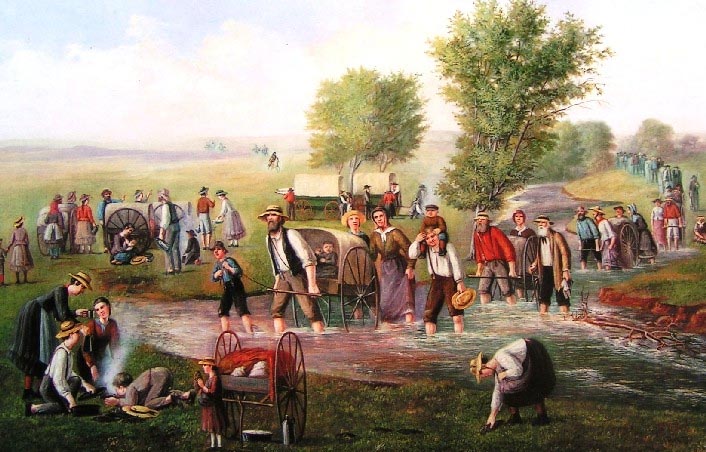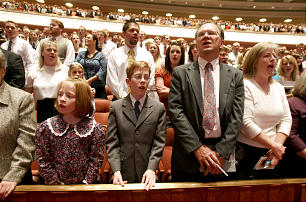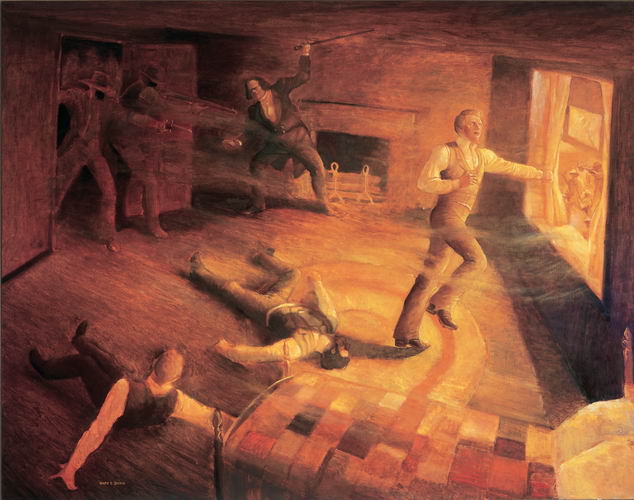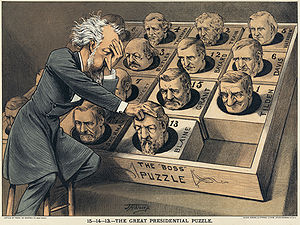-
•
•
8 responses
Times and Seasons is happy to welcome as a guest blogger Steve Smith, who teaches and writes mainly about religious freedom, constitutional law, and jurisprudence. His most recent book is The Disenchantment of Secular Discourse (Harvard University Press, 2010). Steve graduated from BYU in 1976 before studying law at Yale, and he has taught at various law schools including Notre Dame, Colorado, Idaho, Michigan (as a visiting professor), Virginia (as a visitor), and the University of San Diego, where he is currently employed. Steve’s wife Merina also attended BYU, and they have five children. An accomplished musician by most standards… Read More
-
•
•
20 responses
This past week more than 10,000 scientists launched the Vienna Declaration, a call for a major change in handling drug crimes and treatment. Noting that the global war on drugs has failed, the group wants governments to use scientific methods to determine policy instead of, as one health professional puts it, “a moralistic approach.” Read More
-
•
•
14 responses
This little reflection was originally posted on the blog Law, Religion, and Ethics — most of whose readers, if any, are presumably not LDS or residents of Utah. Pioneer Day, in case you didn’t know, is today, July 24; it commemorates the day in 1847 (give or take a day or two) when Brigham Young declared “This is the place,” and the Mormon pioneers entered the Salt Lake Valley. I imagine Pioneer Day is still celebrated in Utah, and it was a festive occasion in Idaho Falls, Idaho, when I was growing up in the 50s and 60s. My mother,… Read More
-
•
•

As the Old Testament tells the history, Hezekiah was the 13th king after David and the 11th king of Judah: David, then Solomon, then Rehoboam (who was king at the time of the split between Judah and Israel, and became the first king of Judah), then Abijah, then Asa, then Jehoshaphat, Joram, Ahaziah, Joash, Amaziah, Uzziah, Jotham, Ahaz, and finally Hezekiah. Hezekiah reigned from 715 B.C. to 687 B.C. King Uzziah was a successful king, but at the end of his career he came into conflict with the temple priests. Whether the description of the conflict that we see in… Read More
-
•
•
43 responses
The call for papers for the Third Biannual Faith and Knowledge Conference for LDS Graduate Students in Religion contains a sentence that is, I think, wrong in three different ways. Read More
-
•
•
26 responses

I spoke in church today. The youth in our stake just completed a four-day handcart pioneer re-enactment, and my remarks followed upon several youth speakers testimonies about their experience. Below is the text of my sermon: Read More
-
•
•
6 responses
You’ve always dreamed of starting a handsome Mormon studies collection — who hasn’t? This week, you have an unprecedented opportunity to start your collection in style. As we’ve mentioned here and elsewhere, Sunstone 2010 is just around the corner. It will take place from August 4th through August 8th in Salt Lake City. Online pre-registration is available up through 5:00 p.m. on Friday, July 30th. And about those prizes? Here goes. — RAFFLE ANNOUNCEMENT All persons who pre-register for Sunstone 2010 between July 26th and July 30th will be automatically entered into the inaugural Fabulous Pre-Registration Prize Raffle. This year’s… Read More
-
•
•
41 responses
Nate’s thoughtful post inspired a great discussion. Andrew spoke up to say: …even though Church leaders could and should stress their own imperfection before Church members, they don’t…but instead they play into this paragon of virtue imagery that people put on them. Wm Morris responded with: I have no desire to see more self-flagellation on the part of our leaders. And I don’t see the paragon of virtue imagery — when general authorities to talk about themselves as persons, they are very often self-deprecating and even talk about their imperfections. “Self-flagellation” is is kind of a stretch. Exposing our own… Read More
-
•
•
97 responses
The church handbook is a foundational document for the lived experience of LDS church members. The handbook (actually two specific handbooks at present, but for convenience’s sake we’ll just refer to it as the handbook) sets out rules regarding a variety of important experiences in church member life. The Encyclopedia of Mormonism notes that the handbook contains “instruction on (1) Church administration and meetings; (2) calling members to Church positions and releasing them from such calls; (3) ordaining members to priesthood offices; (4) performing ordinances and giving blessings; (5) doing sacred temple work, and family history; (6) responding to calls… Read More
-
•
•
21 responses
I got a Kindle a few weeks ago, and my affection for it is quickly approaching idolatry. But we aren’t going to talk about that right now; we’re going to talk about how to Mormon-Studies-geek out your ereader. Here’s what I have found so far; I expect you to add to the fun. Read More
-
•
•
20 responses
Nate has written a very articulate and worthwhile post that I think cuts to the heart of a common problem in how we emotionally respond to issues we have with the church. It goes together well with this other post of his which is similarly worth (re-)reading. I’m responding not because I particularly disagree with the things he has said (though I think he has mis-framed the issue a bit), but because there’s so much more to say on the subject that I fear Nate’s characterization may threaten to cover up rather than shed light on the issue. Read More
-
•
•
42 responses
t seems to me that what is at issue here is less one’s conduct than one’s emotional and intellectual stance. In other words, I suspect that there is relatively little in terms of conduct that would differ between folks here. We’re all interested in remaining faithful, contributing, serving, etc. I suspect that none of us is likely to go along with some great evil perpetrated by the church (such evils being — in my opinion — mainly hypothetical intellectual playthings rather than regular aspects of lived experience). We can all think of changes that we would welcome and that we… Read More
-
•
•
61 responses

I’m currently visiting my in-laws for a few weeks. I attended their ward on Sunday and once again was shocked at the difference in the singing there compared to my home ward. Why don’t members sing the hymns in Sacrament Meeting here? Read More
-
•
•

A reminder: these are not notes for preparing a Sunday School lesson—though they may help a person do that. They are notes for studying the chapters assigned for reading. Arthur Bassett has pointed out these parallels between Elisha, on the one hand, and Moses and Christ, on the other. (All scripture references are to 2 Kings). Elisha parts the water [2:14] (as Moses parted the sea and Joshua and Elijah parted the Jordan)—Jesus parts the heavens at the time of his baptism in the same Jordan. He supplies water [2:19-22] (as had Moses)—Christ presents himself as the living water. Waters… Read More
-
•
•
21 responses

This post is brought to you by the letter “V”. (Don’t worry, that’s grape juice in the picture. Really. I’m sure it is.) Vigor. Verdant. Vibrant. Vivacious. AliVe. These are the qualities I expect true religion to inculcate. Does it make me think more? Does it make me love more? Does it make me see more? Does it make me do more? Does it make me be more? “These things are fun and fun is good.” Does it make life awesomer, and does it make me awesomer? Or, as Parley P. Pratt so effectively stated: The gift of the Holy… Read More
-
•
•
44 responses
This promotional video from BYU’s Harold Lee Library is so well done it deserves it’s own post at Times & Seasons. That’s how good it is. Read More
-
•
•
24 responses

Alright people, here we go…on labels! (apollo, this one’s for you.) Labels of preference These are the labels anyone can just pick for themselves. “Awesome”, “feminist”, and “Abba fan” are all labels of preference. You just pick one, apply it to yourself, and no one can say you’re wrong! These labels aren’t owned by any organization, so they mean whatever you want them to mean. Labels of significance These are labels a person must earn, like “doctor”, “lawyer”, and “cosmetologist”. Labels of significance are “owned” by an organization, like the American Medical Association owns “doctor” (at least in America). In… Read More
-
•
•
8 responses

In 70 AD, the Romans capped their extended campaign to crush a Jewish revolt by destroying the magnificent temple in Jerusalem. The Jews lost their temple. Earlier, they had lost political autonomy and the kingship; later, in 132 AD, another Jewish revolt was suppressed and Jews were barred from living in or even entering Jerusalem. Despite this loss of temple, king, and land, the Jews adapted and Judaism endured. In the 19th century, Mormons had their own sharp if somewhat less dramatic struggle with American government and culture. What did we Mormons lose? Read More
-
•
•

Elijah We know from passages in the New Testament and, especially, from Latter-day revelation, that Elijah is one of the most important prophets to have lived. (In the Jewish tradition, he is second only to Moses.) Yet we know almost nothing about him. Why do you think that is? In addition to the story of his life, in these and the next few chapters of scripture, we have Malachi’s prophecy that Elijah would come to bind the hearts of the fathers and the children (Malachi 4:5), as well as the repetition of that prophecy in several places, notably in D&C… Read More
-
•
•

The material of this lesson, especially that of chapters 12-13, is important to understanding the rest of Old Testament, for the eighty years that it covers details the split that occurred between the ten tribes of Israel in the north and the tribe of Judah/Benjamin in the south. Since these accounts, like the rest of the Old Testament, were edited many years later (for example, after the return from Babylon) by descendants of those in the southern kingdom, you should think about what their point of view would have been and how that might have shaped their version of the… Read More
-
•
•
23 responses

I’ve just been called as a seminary teacher. Today I was sustained during sacrament meeting. I’m really excited about it — I enjoy working with youth, I enjoy the scriptures, and I enjoy teaching. Heck, I’m even a morning person. The course of study is the Doctrine & Covenants. It has me thinking about how to help them understand the role that the scriptures play in the church. When I was twelve-or-so years old, I had a teacher who wanted us to understand the importance of the scriptures. He encouraged us to bring our scriptures to class each week, and… Read More
-
•
•
54 responses

The result of writing Book of Mormon history from back to front, I think, resembles a cross between The Mission and Last of the Mohicans. Read More
-
•
•
95 responses

People leave the church because…well, I don’t know. I’ve had a few acquaintances who’ve decided to be done with it, but I’ve never sat down and talked with them about why. If I were to guess, it’s because they discovered things they didn’t like about the church and decided to head out to where things are better. That’s why this article on gender stereotypes and science caught my eye—it’s easy to think that the cultural difficulties we try to navigate in the church are specific to the church. I wonder how many people leave the church thinking, “I’m done with… Read More
-
•
•
34 responses

If you think that the textual history of the Book of Mormon includes historical records, then you can’t avoid the possibility that a lot of Book of Mormon scholarship has been looking for the wrong people in the wrong place at the wrong time, and reading the wrong verses. The problem is that Book of Mormon chronology is anchored in time only by the fall of Jerusalem and Christ’s appearance to the Nephites. But these events belong to sacral history, and their translation into historical chronology is not necessarily transparent. In the same way, the identification of the Nephites as… Read More
-
•
•
26 responses
Last Sunday, we attended a family member’s baby blessing in a Spanish Ward in Utah. My rudimentary high school Spanish was no help at all. Read More
-
•
•
The Story This week’s lesson focuses on the construction of the first temple. Previously there had been many places for offering sacrifices and several buildings that we would call temples. But this is the first one built on the site traditionally associated with Abraham’s sacrifice of Isaac. As this temple came to prominence, it overshadowed the others and, by the time of the return from Babylon, it became the only one recognized. The first two chapters of 1 Kings are the background for that temple-building. Chapters 1-2 deal with the final days of David, when his son, Adonijah, aided by… Read More
-
•
•
39 responses

The post is brought to you by my wife, Heather. Please be nice to her :) ****** It was time for Dane and I to have a discussion — the, “our baby is approaching 15 months old, do we want to have another one?” discussion. We currently have three wonderful, healthy children. At one point in this discussion I told my husband that I would probably feel guilty for not having more. He was surprised and asked why I should feel guilty. So I told him and the answer surprised him even more. Actually, this is why I am writing… Read More
-
•
•
18 responses
I probably shouldn’t tell you this, but on more than one occasion, I have seriously considered stealing scriptures from the temple. Read More
-
•
•
2 responses
Google maps has added aerial views to a limited number of locations. I just saw (hat tip: Paula) that the San Diego temple is one of them. It’s a pretty cool feature. How do you see it? Unfortunately there’s no one-click link, because you have to enable aerial views. So it’s a slightly more elaborate process: 1. Go to the San Diego temple on Google Maps. (Click here.) 2. Click the little green “Labs” chemical-beaker icon at the top of the screen. (It’s above the Print button). Click “enable” on the tab that asks about Aerial Imagery. That’s it! You… Read More
-
•
•
5 responses
The preliminary program for the Sunstone symposium is available, and includes many familiar names. Some of the bloggernacle folks who are listed include: Wednesday: 9:30 – John Dehlin (Mormon Stories) 2:00 – John Dehlin Thursday: 11:15 – Mormon feminism panel including Alisa (ExII) and Tresa (FMH) 2:15 – Tresa (respondent to Laura Compton) 4:45 – Janet, Kathy, Tresa, and Tracy – Joanna Brooks (Mormon Matters) Friday: 3:30 – Bridget Jack Meyers Jeffries 4:45 – Sheila and Sara panel -Mormon women on tour panel (Joanna Brooks, Holly Welker) 8:00 – Tracy (BCC) Saturday: 11:15 – DKL talking about Glenn Beck. Bring… Read More
